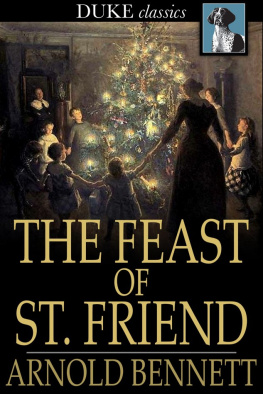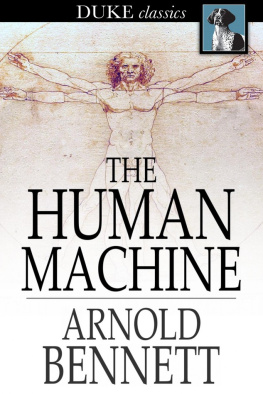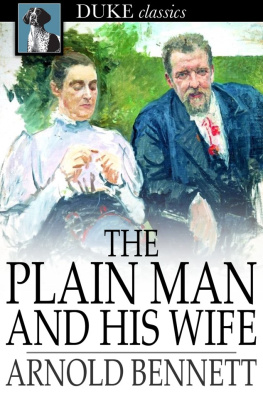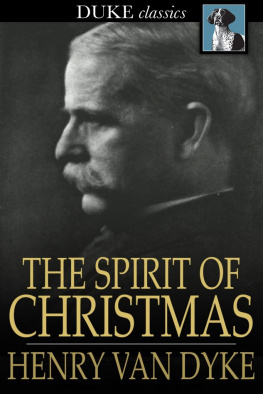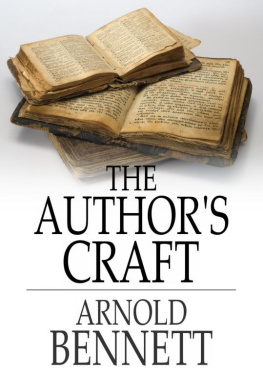Arnold Bennett - The Feast of St. Friend
Here you can read online Arnold Bennett - The Feast of St. Friend full text of the book (entire story) in english for free. Download pdf and epub, get meaning, cover and reviews about this ebook. year: 2014, publisher: Duke Classics, genre: Science. Description of the work, (preface) as well as reviews are available. Best literature library LitArk.com created for fans of good reading and offers a wide selection of genres:
Romance novel
Science fiction
Adventure
Detective
Science
History
Home and family
Prose
Art
Politics
Computer
Non-fiction
Religion
Business
Children
Humor
Choose a favorite category and find really read worthwhile books. Enjoy immersion in the world of imagination, feel the emotions of the characters or learn something new for yourself, make an fascinating discovery.
- Book:The Feast of St. Friend
- Author:
- Publisher:Duke Classics
- Genre:
- Year:2014
- Rating:3 / 5
- Favourites:Add to favourites
- Your mark:
- 60
- 1
- 2
- 3
- 4
- 5
The Feast of St. Friend: summary, description and annotation
We offer to read an annotation, description, summary or preface (depends on what the author of the book "The Feast of St. Friend" wrote himself). If you haven't found the necessary information about the book — write in the comments, we will try to find it.
If the hustle and bustle and toxic consumerism of the holiday season has tarnished your enthusiasm, British author Arnold Bennetts essay collection The Feast of St. Friend is just the restorative balm you need. In a series of thoughtful meditations, Bennett reflects on the true meaning of Christmas and its deep spiritual significance.
The Feast of St. Friend — read online for free the complete book (whole text) full work
Below is the text of the book, divided by pages. System saving the place of the last page read, allows you to conveniently read the book "The Feast of St. Friend" online for free, without having to search again every time where you left off. Put a bookmark, and you can go to the page where you finished reading at any time.
Font size:
Interval:
Bookmark:

First published in 1911
ISBN 978-1-63421-311-0
Duke Classics
2014 Duke Classics and its licensors. All rights reserved.
While every effort has been used to ensure the accuracy and reliability of the information contained in this edition, Duke Classics does not assume liability or responsibility for any errors or omissions in this book. Duke Classics does not accept responsibility for loss suffered as a result of reliance upon the accuracy or currency of information contained in this book.
Something has happened to Christmas, or to our hearts; or to both. Inorder to be convinced of this it is only necessary to compare thepresent with the past. In the old days of not so long ago the festivalbegan to excite us in November. For weeks the house rustled withcharming and thrilling secrets, and with the furtive noises of paperparcels being wrapped and unwrapped; the house was a whispering gallery.The tension of expectancy increased to such a point that there was apositive danger of the cord snapping before it ought to snap. On theEve we went to bed with no hope of settled sleep. We knew that we shouldbe wakened and kept awake by the waits singing in the cold; and we wereglad to be kept awake so. On the supreme day we came downstairs hidingdelicious yawns, and cordially pretending that we had never been morefit. The day was different from other days; it had a unique romanticquality, tonic, curative of all ills. On that day even the tooth-achevanished, retiring far into the wilderness with the spiteful word, thevenomous thought, and the unlovely gesture. We sang with gusto"Christians awake, salute the happy morn." We did salute the happy morn.And when all the parcels were definitely unpacked, and the secrets ofall hearts disclosed, we spent the rest of the happy morn in waiting,candidly greedy, for the first of the great meals. And then we ate, andwe drank, and we ate again; with no thought of nutrition, nor ofreasonableness, nor of the morrow, nor of dyspepsia. We ate and drankwithout fear and without shame, in the sheer, abandoned ecstasy ofcelebration. And by means of motley paper headgear, fit only for acarnival, we disguised ourselves in the most absurd fashions, and yetdid not make ourselves seriously ridiculous; for ridicule is in thevision, not in what is seen. And we danced and sang and larked, until wecould no more. And finally we chanted a song of ceremony, and separated;ending the day as we had commenced it, with salvoes of good wishes. Andthe next morning we were indisposed and enfeebled; and we did not care;we suffered gladly; we had our pain's worth, and more. This was thepast.
Even today the spirit and rites of ancient Christmas are kept up, moreor less in their full rigour and splendour, by a race of beings that isscattered over the whole earth. This race, mysterious, masterful,conservative, imaginative, passionately sincere, arriving from we knownot where, dissolving before our eyes we know not how, has its way inspite of us. I mean the children. By virtue of the children's faith, thereindeer are still tramping the sky, and Christmas Day is stillsomething above and beyond a day of the week; it is a day out of theweek. We have to sit and pretend; and with disillusion in our souls wedo pretend. At Christmas, it is not the children who make-believe; itis ourselves. Who does not remember the first inkling of a suspicionthat Christmas Day was after all a day rather like any other day? In thehouse of my memories, it was the immemorial duty of my brother onChristmas morning, before anything else whatever happened, to sit downto the organ and perform "Christians Awake" with all possible stopsdrawn. He had to do it. Tradition, and the will that emanated from thebest bedroom, combined to force him to do it. One Christmas morning, ashe was preparing the stops, he glanced aside at me with a superciliouscurl of the lips, and the curl of my lips silently answered. It was asif he had said: "I condescend to this," and as if I had said: "So do I."
Such a moment comes to most of us of this generation. And thenceforwardthe change in us is extraordinarily rapid. The next thing we know isthat the institution of waits is a rather annoying survival which atonce deprives us of sleep and takes money out of our pockets. And thenChristmas is gluttony and indigestion and expensiveness and quarter-day,and Christmas cards are a tax and a nuisance, and present-giving is aheavier tax and a nuisance. And we feel self-conscious and foolish as wesing "Auld Lang Syne." And what a blessing it will be when the"festivities" (as they are misleadingly called) are over, and we cansettle down into commonsense again!
I do not mean that our hearts are black with despair on Christmas Day.I do not mean that we do not enjoy ourselves on Christmas Day. There isno doubt that, with the inspiriting help of the mysterious race, and bythe force of tradition, and by our own gift of pretending, we do stillvery much enjoy ourselves on Christmas Day. What I mean to insinuate,and to assert, is that beneath this enjoyment is the disconcerting anddistressing conviction of unreality, of non-significance, of exaggeratedand even false sentiment. What I mean is that we have to brace and forceourselves up to the enjoyment of Christmas. We have to inducedeliberately the "Christmas feeling." We have to remind ourselves that"it will never do" to let the heartiness of Christmas be impaired. Thepeculiarity of our attitude towards Christmas, which at worst is avacation, may be clearly seen by contrasting it with our attitudetowards another vacationthe summer holiday. We do not have to braceand force ourselves up to the enjoyment of the summer holiday. Weexperience no difficulty in inducing the holiday feeling. There is nofear of the institution of the summer holiday losing its heartiness. Nordo we need the example of children to aid us in savouring the August"festivities."
If any person here breaks in with the statement that I am deceived andthe truth is not in me, and that Christmas stands just where it did inthe esteem of all right-minded people, and that he who casts a doubt onthe heartiness of Christmas is not right-minded, let that person read nomore. This book is not written for him. And if any other person,kindlier, condescendingly protests that there is nothing wrong withChristmas except my advancing age, let that person read no more. Thisbook is not written for him, either. It is written for persons who canlook facts cheerfully in the face. That Christmas has lost some of itsmagic is a fact that the common sense of the western hemisphere will notdispute. To blink the fact is infantile. To confront it, to try tounderstand it, to reckon with it, and to obviate any evil that mayattach to itthis course alone is meet for an honest man.
If the decadence of Christmas were a purely subjective phenomenon,confined to the breasts of those of us who have ceased to be childrenthen it follows that Christmas has always been decadent, because peoplehave always been ceasing to be children. It follows also that thefestival was originally got up by disillusioned adults, for the benefitof the children. Which is totally absurd. Adults have never yet inventedany institution, festival or diversion specially for the benefit ofchildren. The egoism of adults makes such an effort impossible, and theingenuity and pliancy of children make it unnecessary. The pantomime,for example, which is now pre-eminently a diversion for children, wascreated by adults for the amusement of adults. Children have merelyaccepted it and appropriated it. Children, being helpless, are of coursefatalists and imitators. They take what comes, and they do the best theycan with it. And when they have made something their own that was adult,they stick to it like leeches.
Font size:
Interval:
Bookmark:
Similar books «The Feast of St. Friend»
Look at similar books to The Feast of St. Friend. We have selected literature similar in name and meaning in the hope of providing readers with more options to find new, interesting, not yet read works.
Discussion, reviews of the book The Feast of St. Friend and just readers' own opinions. Leave your comments, write what you think about the work, its meaning or the main characters. Specify what exactly you liked and what you didn't like, and why you think so.

